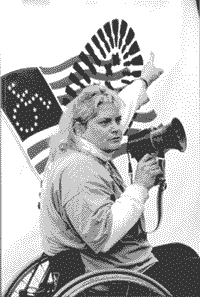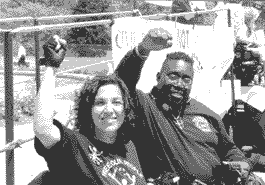The Court that honored our ADA last year may take it away this fall
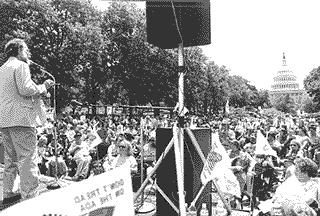
Attorney Steve Gold addresses rally for the ADA on May 12, 1999. Photo by Tom Olin.
![]()
There are two smart things you can do to change this bad news to good. See below.
from communications with Bob
Kafka
![]() While
we spend this summer celebrating the ADA's anniversary, that
same civil rights law could be ruled unconstitutional by the
Supreme Court this fall.
While
we spend this summer celebrating the ADA's anniversary, that
same civil rights law could be ruled unconstitutional by the
Supreme Court this fall.
![]() The
Court in the case of Garrett
v University of Alabama will
answer this critical question: Did Congress overstep its
authority when it passed the ADA? Arguments will likely
be heard in October, with a decision issued in early 2001.
If the Court rules against us, it could be a major step on
the road to gutting the ADA. Recent Court cases on states
rights -- and this is another -- have not been in our favor.
Garrett is a direct attack on our civil rights.
The
Court in the case of Garrett
v University of Alabama will
answer this critical question: Did Congress overstep its
authority when it passed the ADA? Arguments will likely
be heard in October, with a decision issued in early 2001.
If the Court rules against us, it could be a major step on
the road to gutting the ADA. Recent Court cases on states
rights -- and this is another -- have not been in our favor.
Garrett is a direct attack on our civil rights.
![]() Right
now we can build our legal case and send a political message
-- "Don't mess with the ADA!" You can prevent the Attorney
General in your state from signing onto Hawaii's amicus
brief against the ADA. Minnesota's AG is writing a pro-ADA
amicus brief. That's the one we want states to sign onto. As
we learned last year with Olmstead, states CAN take their
names off the Hawaii brief even after the Court has heard
the case.
Right
now we can build our legal case and send a political message
-- "Don't mess with the ADA!" You can prevent the Attorney
General in your state from signing onto Hawaii's amicus
brief against the ADA. Minnesota's AG is writing a pro-ADA
amicus brief. That's the one we want states to sign onto. As
we learned last year with Olmstead, states CAN take their
names off the Hawaii brief even after the Court has heard
the case.
The sky is falling again in Garrett v. U. of Alabama
from Mark Johnson
![]() At
issue in the Garrett case is whether Congress had the
constitutional authority under the Fourteenth Amendment to
enact the ADA. If the Supreme Court says it did not,
individuals (such as L.C. and E.W. in the Olmstead case) may
no longer enforce Titles I and II against states. The
Olmstead decision would be lost, and unenforceable.
At
issue in the Garrett case is whether Congress had the
constitutional authority under the Fourteenth Amendment to
enact the ADA. If the Supreme Court says it did not,
individuals (such as L.C. and E.W. in the Olmstead case) may
no longer enforce Titles I and II against states. The
Olmstead decision would be lost, and unenforceable.
![]() Recently
the Court held, in Kimel v. Florida, that Congress had no
authority to apply the Age Discrimination in Employment Act
to the states. The Court called the ADEA "disproportionate"
and an "unwarranted response to a perhaps inconsequential
problem."
Recently
the Court held, in Kimel v. Florida, that Congress had no
authority to apply the Age Discrimination in Employment Act
to the states. The Court called the ADEA "disproportionate"
and an "unwarranted response to a perhaps inconsequential
problem."
![]() If
states-rights advocates win this case, states would no
longer be required to make their buildings, schools,
courtrooms and services accessible. States could also refuse
to hire or provide reasonable accommodations to employees
with disabilities.
If
states-rights advocates win this case, states would no
longer be required to make their buildings, schools,
courtrooms and services accessible. States could also refuse
to hire or provide reasonable accommodations to employees
with disabilities.
![]()
![]()
![]()
![]()
![]()
What
to do about it
from email
by Bob Kafka and others
![]() 1.
Get your
state's attorney general to sign onto Minnesota's amicus
brief in the Garrett case.
Start by calling his or her office and talking with the
public servants he or she employs. When you get an answer on
where that office stands, organize from there to support or
resist your state's stance.
1.
Get your
state's attorney general to sign onto Minnesota's amicus
brief in the Garrett case.
Start by calling his or her office and talking with the
public servants he or she employs. When you get an answer on
where that office stands, organize from there to support or
resist your state's stance.
![]() 2
.
Promote the
October 2nd Freedom March and Rally in
DC. This is
being coordinated by the American Association of People with
Disabilities (AAPD) and has a host of national groups
working to make it successful.
2
.
Promote the
October 2nd Freedom March and Rally in
DC. This is
being coordinated by the American Association of People with
Disabilities (AAPD) and has a host of national groups
working to make it successful.
![]() The
Supreme Court session opens on October 2nd and they will
hear the Garrett case soon after.
The
Supreme Court session opens on October 2nd and they will
hear the Garrett case soon after.
![]() The
disability community needs to show its support for the ADA
on October 2nd. Bob Kafka and others believe that we should
shoot for 50,000 people with disabilities in DC. This is
only an average of 1,000 people per state.
The
disability community needs to show its support for the ADA
on October 2nd. Bob Kafka and others believe that we should
shoot for 50,000 people with disabilities in DC. This is
only an average of 1,000 people per state.
![]() Rallies
and marches in and of themselves won't save the ADA but it
would be a show of power and energize people as we go back
to our respective states. Your support would be
appreciated.
Rallies
and marches in and of themselves won't save the ADA but it
would be a show of power and energize people as we go back
to our respective states. Your support would be
appreciated.
![]() See
you on the 2nd!!
See
you on the 2nd!!
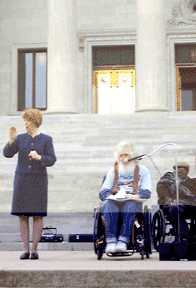
That gray-bearded old Moses
guy speaking at the US District Court's steps in Arkansas
last year to save the ADA is Bob Kafka. Photo by Vikki
Stefans.
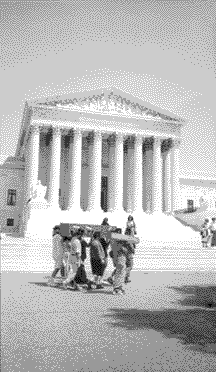
For the Olmstead case, Adapt activists carried a coffin for
our ADA freedoms to the steps of the Supreme Court in May,
1999. Photo by Cal Grandy. See more photos below.
![]()
See some truly psycho news you can do something about. Click here.
This article is reprinted from Mouth #60, the Mouth Chronicles issue.
Below are photos by P.Sue Kullen from the May 12, 1999, rally for the Supreme Court's hearing of the Olmstead case. With 4,000 participants, it was the largest disability rights gathering in history. Some called it "our Woodstock." A crowd of 50,000 would wake up the whole wide world.
